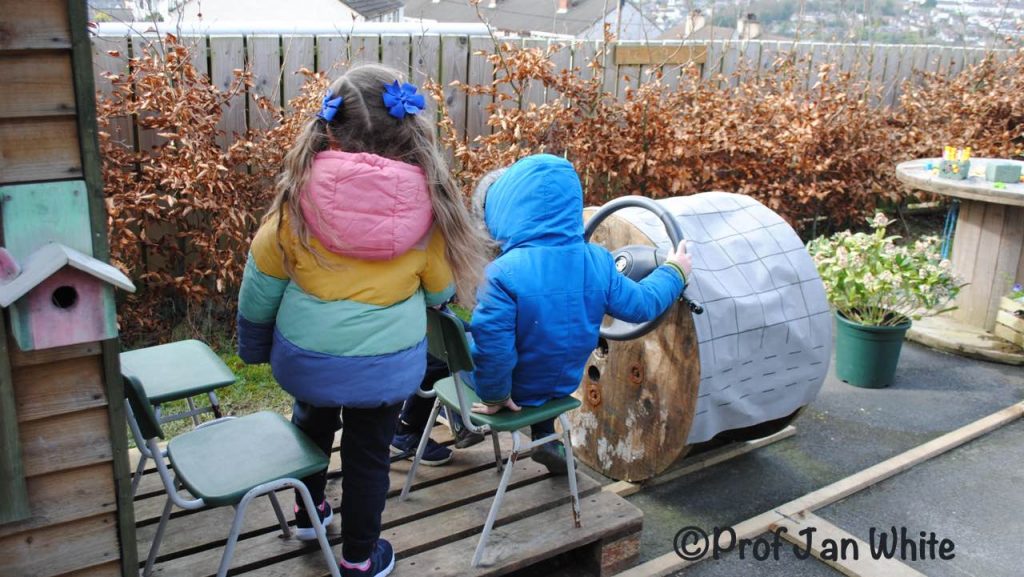The current situation with most children staying at home has caused many a personal reflection on how we have been living our lives, what actually matters to us and what children really need for on-going wellbeing and healthy development. And of course this has also sparked many a thought for how we might find and capture potential benefits amongst the many difficulties and traumas experienced. That the outdoors is an important part of the answer, to both living as individuals and as a nation, is becoming ever more apparent and increasingly talked about.
In this week’s post, Dr Jo Traunter asks whether we might, at long last, reframe our paradigms of learning in schools so that learning outdoors is not only part of the immediate solution, but becomes a key component of our new normal – what a silver lining that would be!
Mainstreaming learning outdoors as part of our new normal by Dr Jo Traunter, Senior Lecturer in Early Childhood Studies and Programmes Director at the University of Hull.
The recent (conditional) government announcement that primary schools will begin reopening their doors early next month following lockdown has caused understandable anxiety amongst families and teaching staff. Reception, Year 1 and Year 6 pupils being the first to return.
As schools begin to consider the challenges of socially distanced schooling for our youngest children, there is an acknowledgment that life will not and cannot be the same as before. One suggestion as an initial step will be to reduce class sizes to between 12 and 15 pupils or a staggered return with fewer pupils. Either way these are short term solutions and this is not a short term problem. Revised publications of school building bulletins in recent years have advocated a steady reduction in area for provision in order to keep investment to an absolute minimum. How then can schools double the number of classrooms and requisite staff to ensure social distancing can work in schools as we know them?

The answer to this question could be to consider a bigger vision for future learning. One idea currently debated is a move toward the Scandinavian concept of outdoor learning, with playgrounds and exterior spaces creating a new wave of innovative outdoor classrooms. Scotland has been the first of the devolved nations to consider the opportunities offered by the outdoor environment, with Maree Todd, Scotland’s children’s minister, stating: “While specialist outdoor nurseries are well attuned to the needs of children spending all day outdoors, other establishments are considering how to adapt their practice to enable more time to be spent in gardens and playgrounds.” As Scotland considers outdoor learning as a template for socially distanced learning, there is a growing consensus that the pandemic could encourage parents and teachers around the UK to embrace the benefits of education in the outdoors. With a growing body of evidence demonstrating that in addition to being outside reducing transmittance of the virus, learning outdoors is also shown to impact on a range of development including physical, communication, health, eyesight, resilience and emotional wellbeing, the case for outdoor learning has never been stronger. More schools could therefore now consider taking advantage of their outdoor areas and exploiting the opportunities offered by these spaces.

Whilst narrowing of the curriculum to focus on core subjects over recent years has discouraged time for creative learning approaches, the evidence is unequivocal that children learn more when they are engaged and happy. Many parents during the lockdown have experienced first-hand how their children have responded to the fun, practical and creative learning experiences offered by home schooling and will be more inclined to support a curriculum with a keener focus on hands on learning. Additionally those children who have not had access to an outdoor space while in lockdown will relish the idea of learning beyond four walls and in the outside spaces schools can offer. With children’s reconnection with nature comes an appreciation and respect for the environment and the interdependence of humans, animals, plants, and lifecycles. To embed in all schools the opportunities for outdoor learning now could prove a tremendous outcome and shape a much needed positive future for our children at a time when they potentially need it most.

All images are © Professor Jan White, with special thanks to Bognor Regis Nursery School and St Clare’s Abbey, Newry, Co Down. Images must not be used without written permission from the photographer or Early Childhood Outdoors.


Hi Jan I found this article very interesting as I use my outdoor space daily for my minded children. I am a Child minder in Scotland and have been looking after a keywords child during lockdown. I won the Nancy Ovens Award for Play in 2017 for my outdoor play.
Hello Lorraine, I’m so pleased that you found ECO and I’d love to know more about your work – do you have a website or Facebook page? If you’d like to share something of your work on this blog, do please get in touch at info@earlychildhoodoutdoors.org
Sounds good to me, Jan!